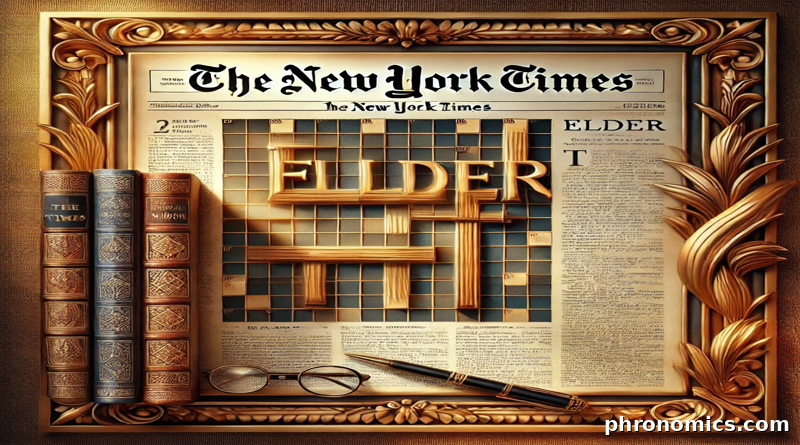ENCOUNTER if I accept a challenge today in the New York Times Crossword between its difficult clues and stylish grid system. Among the clues, the “Statesman NYT Crossword” explores two layers of hidden meaning alongside complex word and government references.
Deciphering the Clue:
At first glance, the clue might seem perplexing. How does one complete the “Statesman NYT Crossword“? The answer, of course, is “elder.” This seemingly simple solution, however, unlocks a wealth of interpretations and connections.
The “Elder Statesman” Concept
A “elder statesman” describes a past senior official from the political sector who maintains important powers because they possess extensive experience and wise understanding. People in this role become respected because they maintain professional detachment through impartial judgment as they offer vital expertise beyond the divisive partisan nature found during times of active politics.
- Key Characteristics of an Elder Statesman:
- Extensive Experience: Deep understanding of political systems, historical precedents, and international relations.
- Objectivity: Freed from the pressures of office, they can offer unbiased opinions and advice.
- Respect and Influence: Command respect from current leaders and the public due to their past achievements and wisdom.
- Focus on National Interest: Nations deserve priority status over the well-being of individual personal interests or partisan division.
Historical Examples of Elder Statesmen
Throughout history, numerous figures have exemplified the role of the elder statesman:
- George Washington (United States): Washington established the precedent for presidents after himself before helping run his estate at Mount Vernon while contributing to important national debates.
- Nelson Mandela (South Africa): Throughout his lifetime Mandela dedicated himself to advocating for peace alongside social justice and national reconciliation internationally.
- Henry Kissinger (United States): During his time as Secretary of State Kissinger established himself as an important figure in diplomatic relations who regularly provides detailed commentary on international problems.
The “Statesman NYT Crossword” Clue: A Deeper Dive
The appearance of “Statesman NYT Crossword” as a clue within the puzzle presents a fascinating intersection of politics, wordplay, and the cultural significance of the New York Times.
- Wordplay and Ambiguity:
- The clue itself is a clever play on words, combining the political term “elder statesman” with the familiar “New York Times Crossword.”
- This ambiguity forces solvers to grapple with multiple meanings and consider the interplay between political and cultural contexts.
- It challenges solvers to think outside the box and move beyond simple definitions to understand the nuances of language.
- Political Commentary:
- The clue can be interpreted as a subtle commentary on the role of experience and wisdom in navigating complex challenges.
- By linking “elder statesman” with the renowned “New York Times Crossword,” the clue may allude to the puzzle itself as a form of intellectual exercise, cultivating wisdom and critical thinking.
- The reference points at both the socio-intellectual power and cultural impact of The New York Times’ famous crosswords upon American society.
The Impact on Solvers
The “Statesman NYT Crossword” clue serves as a reminder of the multifaceted nature of language and the importance of critical thinking.
- Encouraging Deeper Analysis:
- It prompts solvers to go beyond simply finding the correct answer and delve into the deeper layers of meaning and implication within the clue.
- The approach deepens the level of involvement during gameplay and improves the total problem-solving satisfaction.
- Expanding Vocabulary and Knowledge:
- Reading unfamiliar terms and concepts during puzzle-solving leads solvers to discover new information which expands their vocabulary bank.
- Greater intellectual interest breaks out in people who face challenging vocabulary while solving puzzles. They develop a stronger drive to learn additional subjects.
- Promoting Critical Thinking and Problem-Solving Skills:
- To solve these puzzles individuals must decode the clue meaning while applying critical thinking approaches and logical reasoning and problem-solving abilities.
- The essential abilities which crossword solving teaches are effective for both solving crosswords and handling real-life situations including career and personal obstacles and complex societal topics.
1 The “Statesman NYT Crossword” Clue: A Reflection on Language and Culture
The “Statesman NYT Crossword” clue serves as a microcosm of how language can be used to create layers of meaning and invite deeper reflection. The example depicts how ordinary word games merge with pervasive political talks while also representing academic intellectual processes.
Through this straightforward clue investigation we recognize three fundamental aspects related to the enduring appeal of New York Times Crosswords. Language power and the value of critical thinking ability alongside their influence on intellectual growth and cultural dialogue.
FAQs
- What does the Statesman NYT Crossword require us to solve?
- The answer is “elder.”
- What role does “elder statesman” play in understanding world history?
- A former senior government official can maintain his power and share guidance. Because of his accumulated knowledge and political experience following retirement.
- How does the “Statesman NYT Crossword” clue relate to politics?
- The text merges an aging political figure label with standardized newspaper crossword clues to form an intellectual wordplay while exploring expertise management across complex problems and media organization power dynamics.
- What factors make someone qualify as an elder statesman?
- Extensive experience in political systems, historical precedents, and international relations.
- Objectivity and impartiality in offering advice.
- Respect and influence earned through past achievements and wisdom.
- A focus on the national interest above personal or partisan agendas.
- What are some historical examples of elder statesmen?
- George Washington (United States)
- Nelson Mandela (South Africa)
- Henry Kissinger (United States)
Conclusion
The “Statesman NYT Crossword” clue, while seemingly simple, offers a deeper layer of meaning and encourages solvers to think critically and engage with the puzzle on a more intellectual level. Our understanding increases about experienced advisors who contribute to society after investigating their function and societal value. This crossword struggles notes that basic puzzles may hold deeper messages which expand our knowledge base beyond normal expectations.










